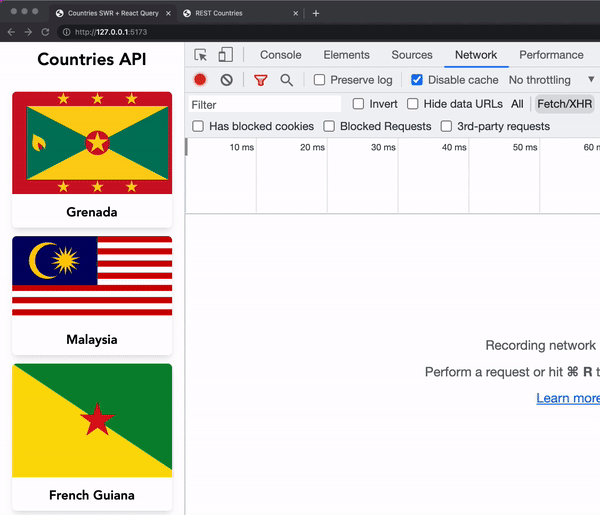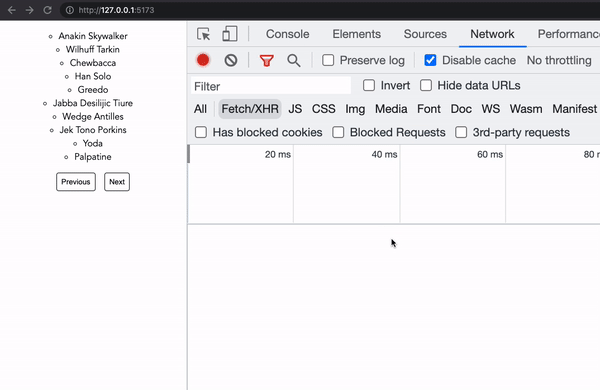Stale While Revalidate

Stale While Revalidate (SWR)
Stale While Revalidate was created to improve the performance of the websites when fetching data. It is a cache strategy that loads a stale version of the resources and you can use it as a library of React Hooks.
SWR works thanks to the HTTP RFC 5861 caching extension because it allows developers to set the time a cache should use a stale response while simultaneously revalidating the fresh data with the origin server. It helps the website's performance because the client does not wait for the server's response. This configuration is specified in the Cache-Control header of the HTTP response.
In a nutshell, SWR:
- Get the stale data from the cache.
- Revalidates the data.
- Comes with up-to-date data.
SWR was created by the team behind Vercel and NextJS.
How to use it
I'll use the SWR with REST Countries API in a React Component.
import useSWR from 'swr'; import './App.css'; // In charge of returning the data. Native fetch or Axios can be used. const fetcher = (...args) => fetch(...args).then((data) => data.json()); function App() { // Destructure the resources, the error and isLoading state. // We pass the API endpoint as the key and the fetcher function as parameters. // useSWR is a React Hook. const { data: countries, error, isLoading, } = useSWR('https://restcountries.com/v3.1/all', fetcher); if (error) return <div>Failed to load...</div>; if (isLoading) return <div>Loading...</div>; return ( <div className='App'> <h1 className='countries-title'>Countries API</h1> <Countries countries={countries} /> </div> ); }
One of the features of SWR is the Revalidation on focus. If the user blurs the window and comes back, it will fetch the data again. You can test it by inspecting the network tab in the browser dev tools, clicking outside the window and clicking within the project again.
 The data is fetched once the user comes back.
The data is fetched once the user comes back.
You can remove this option by sending additional configurations:
const { data: countries, error, isLoading, } = useSWR('https://restcountries.com/v3.1/all', fetcher, { revalidateOnFocus: false, });
Mutation
You can mutate any key by using the mutate API.
import { mutate } from 'swr'; function App() { // You can call mutate to revalidate new data in any key mutate(key, data, options); }
Pagination
We can create a custom Page that will use the useSWR hook and will display the data.
// In charge of returning the data. Native fetch or Axios can be used. const fetcher = (...args) => fetch(...args).then((data) => data.json()); function StarWarsPage({ index }) { const { data, error, isLoading } = useSWR( `https://swapi.dev/api/people/?page=${index}`, fetcher ); if (error) return <div className='centered'>Failed to load...</div>; if (isLoading) return <div className='centered'>Loading...</div>; return ( <ul className='characters'> {data.results.map((item) => ( <li key={item.name} className='character'> {item.name} </li> ))} </ul> ); }
The magic happens in the following abstraction, where we preload the data on the previous page.
function App() { return <StarWars Page={StarWarsPage} />; } function StarWars({ Page }) { const [pageIndex, setPageIndex] = useState(1); return ( <div> {/* We could use whatever paginated component */} <Page index={pageIndex} /> {/* Because of SWR's cache, we get the benefit to preload the next page */} <div style={{ display: 'none' }}> <Page index={pageIndex + 1} /> </div> <div className='button-container'> <button className='button' onClick={() => setPageIndex(pageIndex - 1)} disabled={pageIndex === 1} > Previous </button> <button className='button' onClick={() => setPageIndex(pageIndex + 1)}> Next </button> </div> </div> ); }
 The next page's data is pre-fetched.
The next page's data is pre-fetched.
Conclusion
SWR hook is a powerful tool for performance issues when working with React Data Fetching. It provides a lot of alternatives when working with cache, pagination, prefetching, SSG & SSR, mutation & revalidation, among others.
